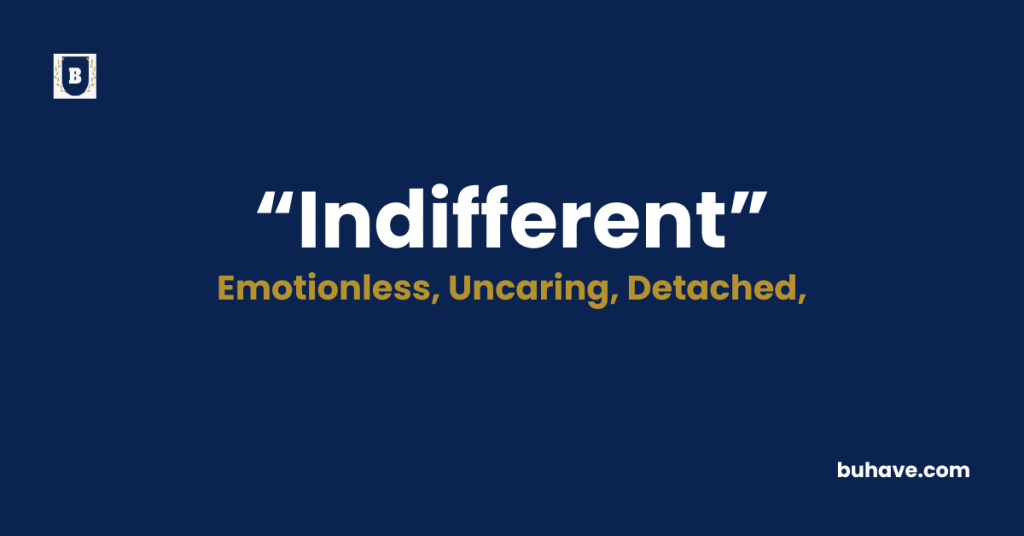The word Indifferent (Adjective) describes a lack of interest, concern, or emotional response toward something or someone. In this guide, you’ll learn the full definition, synonyms, antonyms, etymology, and real-life examples of how to use Indifferent correctly in sentences.
Indifferent Explained in Depth
A complete and detailed guide to the word Indifferent including meaning, definition, examples, etymology, synonyms, and antonyms.
Meanings of Indifferent
Indifferent means showing no particular interest or concern; feeling or acting in a neutral, unconcerned, or emotionally detached way. It can describe a person’s attitude, behavior, or response that seems uncaring, passive, or emotionally disengaged.
Definition
Indifferent refers to a state of emotional neutrality or a lack of strong feelings either positive or negative toward a person, event, or situation. This word is often used when someone appears unconcerned, dispassionate, or unmotivated. For example, a person who is indifferent to politics doesn’t care about political discussions or outcomes. In some cases, being indifferent can suggest apathy or emotional detachment, while in others it can mean being fair-minded and unbiased.
The word can apply to emotional states, decisions, and even product quality, such as an “indifferent performance” meaning it was neither good nor bad. In emotional and interpersonal contexts, however, indifference is typically seen as a lack of empathy, warmth, or engagement, and may be hurtful or frustrating to others.
Etymology
The word indifferent comes from the Latin indifferens, meaning “not making a difference” or “not distinct.” It combines in- (not) and differre (to differ). The term entered English in the 14th century, originally meaning impartial or unbiased. Over time, its meaning shifted to include apathy or a lack of concern. While “indifferent” originally had a more neutral or even positive connotation implying fairness or lack of bias—today it more often conveys emotional detachment or a lack of care. It’s commonly used in everyday language, psychology, social studies, and literature to highlight passive or disengaged attitudes.
Example Sentences
- She seemed indifferent to the outcome of the discussion.
- He was indifferent to praise or criticism, focused only on the work.
- The manager’s indifferent attitude upset the entire team.
Indifferent Synonyms
- Unconcerned
- Apathetic
- Detached
- Uninterested
- Dispassionate
- Emotionless
- Nonchalant
- Uncaring
- Neutral
- Cold
Indifferent Antonyms
- Concerned
- Empathetic
- Passionate
- Involved
- Interested
- Engaged
- Caring
- Responsive
- Warm
- Emotional
FAQs about Indifferent
Here are some frequently asked questions (FAQs) about the word “Indifferent”
1. What does “indifferent” mean?
It means lacking interest, concern, or emotional engagement with a person, topic, or situation.
2. Is indifference always negative?
Not always. While often viewed negatively in relationships, it can also mean fairness or emotional control in certain situations.
3. What causes someone to be indifferent?
Indifference may stem from apathy, emotional burnout, depression, or a desire to remain impartial.
4. How is indifference different from neutrality?
Neutrality implies a balanced or unbiased position, while indifference implies a lack of interest or emotional involvement.
5. Can indifference be harmful in relationships?
Yes, emotional indifference can lead to disconnection, misunderstandings, and a lack of support in personal relationships.

















